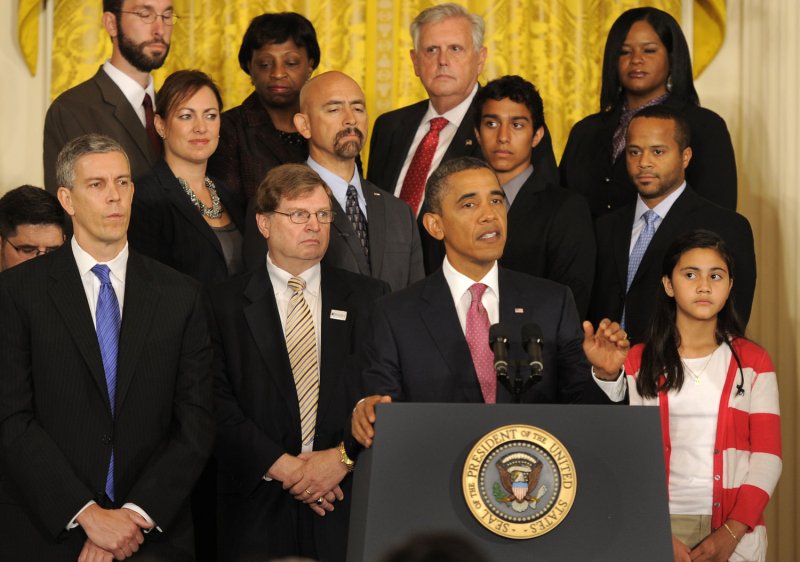U.S. President Barack Obama makes remarks on reforming the No Child Left Behind education program, September 23, 2011 at the White House, Washington, DC. Attending are Education Secretary Arne Duncan (L), and educators and students. Obama called for the need to provide relief to states on certain provisions of the program, a legacy of previous President George W. Bush's administration. UPI/Mike Theiler |
License Photo
WASHINGTON, Sept. 23 (UPI) -- U.S. President Barack Obama Friday rescinded parts of the Bush education initiative that resulted in lower standards.
Saying the No Child Left Behind Act had "admirable" goals, Obama said it has actually resulted in a dumbing down of the education system. Friday's announced changes would enable schools to set higher standards and avoid being penalized for failing to reach specified goals.
"So starting today, we'll be giving states more flexibility to meet high standards," Obama said. "Keep in mind, the change we're making is not lowering standards; we're saying we're going to give you more flexibility to meet high standards. We're going to let states, schools and teachers come up with innovative ways to give our children the skills they need to compete for the jobs of the future."
Otherwise, Obama warned, we'll be engaged "in a race to the bottom."
"So this isn't just the right thing to do for our kids -- it's the right thing to do for our country. We can't afford to wait for an education system that is not doing everything it needs to do for our kids," said Obama, who was flanked by Education Secretary Arne Duncan, several state officials, teachers and students as he delivered his remarks in the White House East Room.
The new plans and evaluations would still need to be linked to student test results and other performance measures, and students would still need to be considered ready for college or a career, administration officials said in advance of Obama's announcement.
As the law is now written, a school failing to meet 2014 requirements would face serious sanctions, including staff dismissals, conversion to a charter school or closure altogether.
"Our administration will provide flexibility from the law in exchange for a real commitment to undertake change," Obama said in a statement Thursday.
The administration also wants the law -- which passed Congress with broad bipartisan support in 2001 and applies to all public schools receiving federal funding -- to stop labeling so many reasonably managed schools as "failing" for missing required passing rates on state achievement tests, the White House said.
Instead, the administration wants to refocus energy on turning around the few thousand schools in the worst shape -- and for the law to recognize schools making progress, even if they still have academic struggles, a senior administration official said.
The White House six months ago sent its plan to revamp the No Child law to Congress, but the legislation stalled, so the administration chose to bypass lawmakers.
Forty-five states helped develop the new guidelines, senior administration officials told reporters Thursday. And most states and the District of Columbia plan to adopt a common set of college and career-ready standards, the officials said.
Obama's reform gives Duncan -- who in August said the existing law was "far too punitive" and "far too prescriptive" -- power to let states adopt their own standards by sidestepping certain NCLB requirements.
"While I appreciate some of the policies outlined in the secretary's waivers plan, I simply cannot support a process that grants the secretary of education sweeping authority to handpick winners and losers," House Education and Workforce Committee Chairman John Kline, R-Minn., said.
But Rep. George Miller, D-Calif., the ranking Democrat on Kline's committee, said many states and districts were "outrunning the ability of NCLB to provide them a path forward."
"Waivers [are a way] to make sure that we continue the tenets of NCLB to provide high standards, provide accountability [and] make sure we meet the civil rights demands of the law," he said.
At least 13 states have already sought waivers, and more than a dozen more said Thursday they intended to apply for them, a United Press International review indicated.
South Dakota, Montana and Idaho told federal officials they would simply disregard key aspects of the law, The Wall Street Journal reported.















